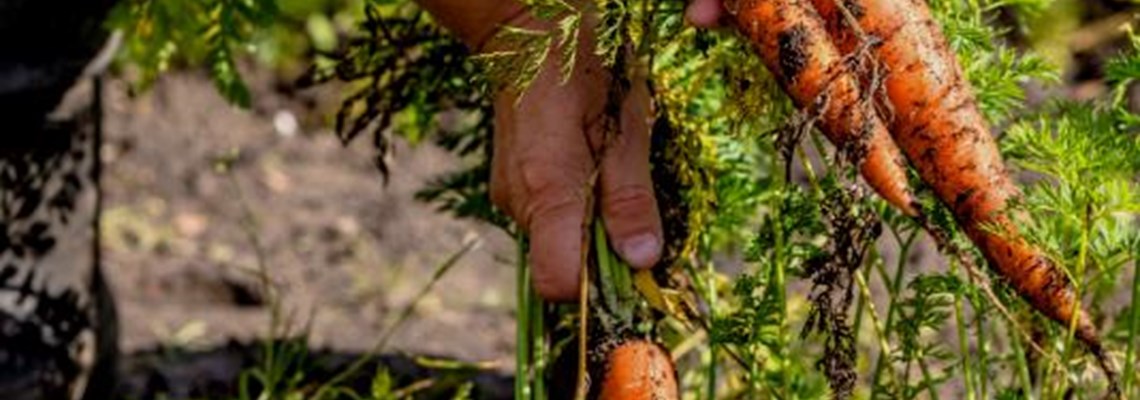Tyfu Cymru announce new training programmes designed to boost the horticulture industry in Wales…
Friday, 29 January 2021

Campaigners have recently urged for three-quarters of the Welsh population's recommended daily intake of vegetables to be grown in Wales by 20301. Food Policy Alliance Cymru said this could be achieved in a sustainable way with more support for small-scale horticulture farms and gardens.
A recent study suggested that currently less than 0.1% of Wales' land is used to grow vegetables. If what is produced in the country at present had to be shared out to everyone in Wales, it would only equate to a quarter of a vegetable portion per person each day.
It’s not as easy as simply sowing more seeds, not all of Wales’ land is classed as suitable for arable cropping, but there is still a lot of room to grow. However, it’s also not about growth at any cost, says Sarah Gould, Project Manager at Tyfu Cymru:
“Access to natural and finite resources such as land, energy and water are vital to growing produce. The careful management of these natural resources is needed to open-up opportunities to expand horticulture in Wales”
A taskforce set up by the Welsh Government to ensure a green recovery from the coronavirus pandemic has also recommended boosting horticulture. This is echoed in the Action Plan for the Commercial Horticulture Industry in Wales2, which provides a roadmap and actions in-line with Welsh Government strategic objectives.
Led by Tyfu Cymru, a project managed by Lantra, and with funding from the Welsh Government Cooperation and Supply Chain Development scheme, the Action Plan for Wales outlines a multi-stakeholder, whole supply chain approach to develop and sustain the commercial production of edible and ornamental horticulture produce in Wales for the long term.
Tyfu Cymru believes farmers are a strong resource when it comes to increasing Welsh food production and strengthening the industry.
Horticulture can be a tricky sector to navigate with production often being time and resource heavy, particularly in the start-up phase. However, by already having access to land, and a good understanding of the food and farming industry, farmers have a strong advantage when getting started. Diversification into horticulture presents an opportunity to tap into new or existing local and national markets and developing a new income stream to support the current business model can limit risk and provide security to a farm business. Diversifying also creates an opportunity to utilise previously under-used land, increase local food production and strengthen the local economy.
Tyfu Cymru are therefore pleased to launch the Diversifying into Horticulture Programme, which is designed to give farmers the best start into horticulture production. Through the delivery of tailor-made training and support, it focuses on important areas such as diversification and market options, planning permission and infrastructure, marketing and product development, hiring and leasing and contracts.
A series of new programmes have also been launched to further support existing growers. For growers looking to appeal to a wider or alternative customer base and retail market, The Farm Assurance Training Series is a collection of webinars, training and support aimed at growers considering applying for agricultural standards or schemes, including Red Tractor, Soil Association M&S Select Farm and LEAF.
Although common for supply into large retailers and food processors, many smaller wholesalers and specialist shops are now requiring growers to be certified to a recognised agricultural standard as a way to demonstrate their commitment to food safety, the environment or organic status. Certification to a recognised agricultural standard can be seen as getting a foot into a prospective customers door.
In addition, Tyfu Cymru’s 12-month Seed Production Training is designed to give growers the tools to grow open pollinated vegetable seed crops competently. It will offer an overview of the political, ethical, and economic context of seed production in Wales. It will cover topics as broad ranging as plant botany, seed cultivation, seed sovereignty and seed justice.
Producing an open pollinated seed crop on farm can improve the quality of future crops, increase plant adaptation to local conditions, and give access to new varieties and new skills. Seed production can also bring an added income stream to the farm through contract growing or direct sales in the future.
Whilst Tyfu Cymru isn’t able to offer capital grants or direct funding, they are able to offer 100% funded support for training and development for the Horticulture Industry. Whether it be technical advice to improve the yields from crops, guidance on new growing techniques or training on improving digital marketing channels.
For more information on the new Training Programmes through Tyfu Cymru please visit: https://www.tyfucymru.co.uk/home/whats-new/training-programmes/
